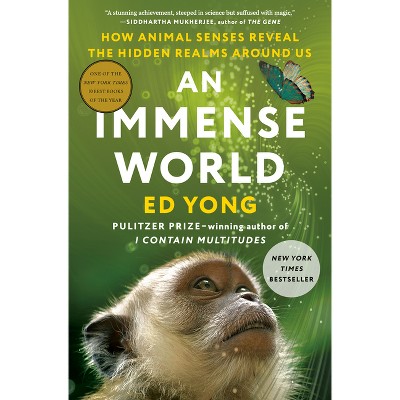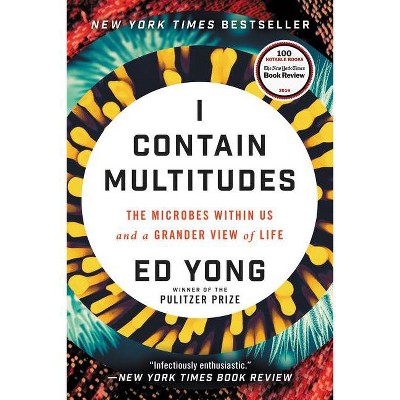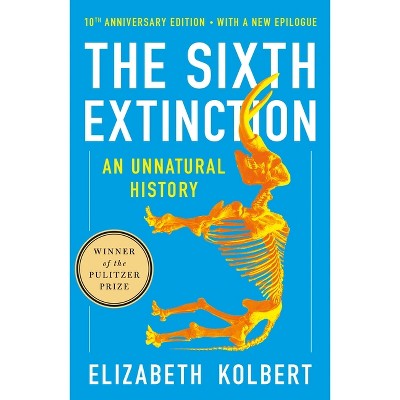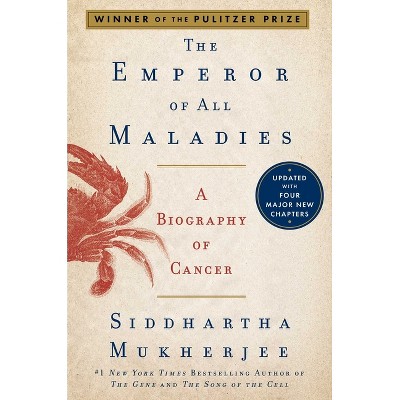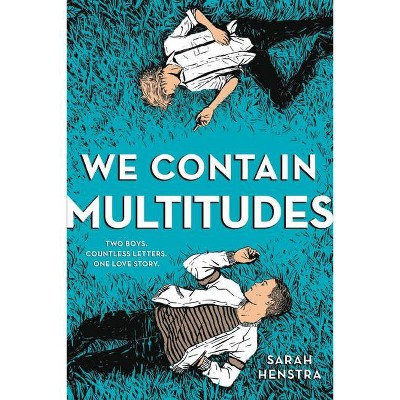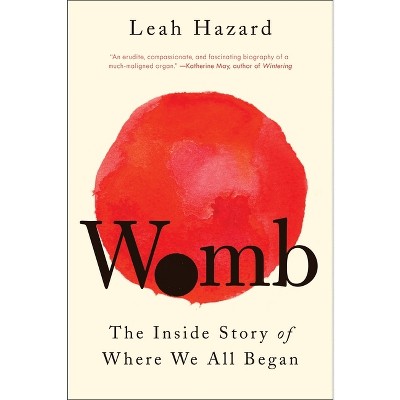Sponsored

I Contain Multitudes - by Ed Yong
In Stock
Sponsored
About this item
Highlights
- New York Times BestsellerNew York Times Notable Book of 2016 - NPR Great Read of 2016 - Named a Best Book of 2016 by The Economist, Smithsonian, NPR's Science Friday, MPR, Minnesota Star Tribune, Kirkus Reviews, Publishers Weekly, The Guardian, Times (London)From Pulitzer Prize winner Ed Yong, a groundbreaking, wondrously informative, and vastly entertaining examination of the most significant revolution in biology since Darwin--a "microbe's-eye view" of the world that reveals a marvelous, radically reconceived picture of life on earth.Every animal, whether human, squid, or wasp, is home to millions of bacteria and other microbes.
- Author(s): Ed Yong
- 368 Pages
- Science, Life Sciences
Description
About the Book
"Originally published in the United Kingdom in 2016 by Bodley Head"--Title page verso.Book Synopsis
New York Times Bestseller
New York Times Notable Book of 2016 - NPR Great Read of 2016 - Named a Best Book of 2016 by The Economist, Smithsonian, NPR's Science Friday, MPR, Minnesota Star Tribune, Kirkus Reviews, Publishers Weekly, The Guardian, Times (London)
From Pulitzer Prize winner Ed Yong, a groundbreaking, wondrously informative, and vastly entertaining examination of the most significant revolution in biology since Darwin--a "microbe's-eye view" of the world that reveals a marvelous, radically reconceived picture of life on earth.
Every animal, whether human, squid, or wasp, is home to millions of bacteria and other microbes. Pulitzer Prize-winning author Ed Yong, whose humor is as evident as his erudition, prompts us to look at ourselves and our animal companions in a new light--less as individuals and more as the interconnected, interdependent multitudes we assuredly are.
The microbes in our bodies are part of our immune systems and protect us from disease. In the deep oceans, mysterious creatures without mouths or guts depend on microbes for all their energy. Bacteria provide squid with invisibility cloaks, help beetles to bring down forests, and allow worms to cause diseases that afflict millions of people.
Many people think of microbes as germs to be eradicated, but those that live with us--the microbiome--build our bodies, protect our health, shape our identities, and grant us incredible abilities. In this astonishing book, Ed Yong takes us on a grand tour through our microbial partners, and introduces us to the scientists on the front lines of discovery. It will change both our view of nature and our sense of where we belong in it.
From the Back Cover
A groundbreaking, marvelously informative "microbe's-eye view" of the world that reveals a radically reconceived picture of life on earth.
For most of human existence, microbes were hidden, visible only through the illnesses they caused. When they finally surfaced in biological studies, they were cast as rogues. Only recently have they immigrated from the neglected fringes of biology to its center. Even today, many people think of microbes as germs to be eradicated, but those that live with us--the microbiome--are invaluable parts of our lives.
I Contain Multitudes lets us peer into that world for the first time, allowing us to see how ubiquitous and vital microbes are: they sculpt our organs, defend us from disease, break down our food, educate our immune systems, guide our behavior, bombard our genomes with their genes, and grant us incredible abilities. While much of the prevailing discussion around the microbiome has focused on its implications for human health, Yong broadens this focus to the entire animal kingdom, giving us a grander view of life.
With humor and erudition, Ed Yong prompts us to look at ourselves and our fellow animals in a new light: less as individuals and more as the interconnected, interdependent multitudes we assuredly are. When we look at the animal kingdom through a microbial lens, even the most familiar parts of our lives take on a striking new air. We learn the secret, invisible, and wondrous biology behind the corals that construct mighty reefs, the glowing squid that can help us understand the bacteria in our own guts, the beetles that bring down forests, the disease-fighting mosquitoes engineered in Australia, and the ingredients in breast milk that evolved to nourish a baby's first microbes. We see how humans are disrupting these partnerships and how scientists are now manipulating them to our advantage. We see, as William Blake wrote, the world in a grain of sand.
I Contain Multitudes is the story of these extraordinary partnerships, between the familiar creatures of our world and those we never knew existed. It will change both our view of nature and our sense of where we belong in it.
Review Quotes
"A science journalist's first book is an excellent, vivid introduction to the all-enveloping realm of our secret sharers." - New York Times Book Review, Editors' Choice
"In this powerful treatise on the benefits of ecological thinking, Yong describes the vast and ancient yet still poorly understood world of microbiota, whose study in isolation has yielded poor results. As researchers have started to examine microscopic communities, they've produced new insights on a range of biological systems and animal behaviors." - Publishers Weekly's Best Books of the Year
"[An] excellent and vivid introduction to our microbiota, or microbiome, the all-enveloping realm of our microbes . . . I Contain Multitudes has a terrific story to tell . . . [Yong] is infectiously enthusiastic about microbes, and he describes them with verve . . . Even the book's endnotes are rich with interesting asides, swarming with interesting sidelights, a teeming microbial world." - New York Times Book Review (A NYT Notable Book of 2016)
"[An] excellent and vivid introduction to our microbiota. . . . infectiously enthusiastic." - New York Times Book Review
"The strong narrative, rigorous reporting and fluid writing make I Contain Multitudes one of the most essential science books of the year. Yong's wit, and endearing inability to pass up an opportunity for wordplay, are just a couple of the many bonuses that make it enjoyable, too." - Philly Voice
"Yong writes like Sagan did, with humor and a deep understanding of science. The incredible partnerships these microbes have with all of us, the weird facts that enlighten our knowledge, our own view of nature: they all will change once we understand these partnerships better." - GeekDad
"Offer[s] engrossing-and gross-details about how an invisible world shapes our species...Mr. Yong's book lives up to its title, containing multitudes of facts presented in graceful, accessible prose....The author wonderfully turns to the humanities again and again to enrich the book's scientific detail...And he's funny." - Wall Street Journal
"For a lesser writer, the temptation to oversimplify the science or to sex up unwarranted conclusions might have proved irresistible. Mr Yong expertly avoids these pitfalls.... I Contain Multitudes bowls along wonderfully without it. His hero, Sir David [Attenborough], would surely approve." - The Economist (A Best Book of 2016)
"[Yong's] enthusiasm and wonder are propulsive. While [he] acknowledges that the questions outnumber the answers in this relatively nascent field, he thrills to the potential inherent in what scientists have already learned about microbes' astonishing powers. As a result, so do we." - The Week
"Fascinating and elegantly written. . . . Yong peels the veneer of the visible to reveal the astonishing complexity of life thriving beneath and within the crude confines of our perception. . . . masterful [and] intensely interesting." - Brainpickings (A Best Science Book of 2016)
"A must-read for the curious and science-minded, Yong's book helps guide us through this exciting landscape." - Bookpage
"[A] informative and infectiously readable book." - Cell
"Not since de Kruif's classic, "Microbe Hunters, '' has this invisible world been brought so vividly to life... Yong's curiosity and humor made me smile and even laugh out loud, much to my husband's surprise. By the end of the book his sense of wonder for microbes was, well, infectious." - Boston Globe
"Ed Yong's I Contain Multitudes is wonderful. Deeply strange, true, funny, beautifully written." - William Gibson
"Masterful . . . a tale that shifts our personal cosmology and compels us to look anew at the world." - The Guardian (A Best Book of 2016)
"Readable and entertaining. . . . Highly recommended for general science readers interested in the complicated relationships between microbes and their hosts." - Library Journal
"Beautifully written. . . . Yong - who like Carl Zimmer belongs to the highest tier of science journalists at work today - weaves revelatory anecdotes and cutting-edge reporting into an elegant, illuminating page-turner." - Minneapolis Star Tribune (A Best Book of 2016)
"A delightful, witty book. Yong vividly describes the intricate alliances forged by microbes with every other organism on the planet - Science
"Beautiful, smart, and sometimes shocking." - Wired
"Yong has captured the essence of this exciting field, expressing the enthusiasm and wonder that the scientific community feels when working with the microbiome." - Professor Jack Gilbert, University of Chicago
"An exceptionally informative, beautifully written book that will profoundly shift one's sense of self to that of symbiotic multitudes." - Kirkus Reviews (starred review)
"Yong makes a superb case for his position by interviewing numerous scientists and presenting their fascinating work in an accessible and persuasive fashion." - Publishers Weekly (starred review)
"Bottom line: don't hate or fear the microbial world within you. Appreciate its wonders. After all, they are more than half of you." - Booklist (starred review)
"A marvelous book! Ed Yong's brilliant gift for storytelling and precise writing about science converge in I Contain Multitudes to make the invisible and tiny both visible and mighty. A unique, entertaining, and smart read." - Jeff VanderMeer, author of the "Southern Reach Trilogy"
"Ed Yong has written a riveting account of the microbes that make the world work. I Contain Multitudes will change the way you look at yourself--and just about everything else." - Elizabeth Kolbert, author of The Sixth Extinction
"Ed Yong is one of our finest young explainers of science-wicked smart, broadly informed, sly, savvy, so illuminating. And this is an encyclopedia of fascinations-a teeming intellectual ecosystem, a keen book on the intricacies of the microbiome and more." - David Quammen, author of Spillover
"I Contain Multitudes changes you the way all great science writing does. You become disoriented, looking at the world around you in a new way. With vivid tales and graceful explanations, Ed Yong reveals how the living things we see around us are wildly complex collectives." - Carl Zimmer, author of Parasite Rex
"Beyond fascinating. An amazing book. It'll change the way you think about the world. It'll change who you think you are." - Helen Macdonald, author of H Is for Hawk
"This compelling and beautifully written book will change the way people look at the world around, and within, them. Certainly among the best books in an increasingly crowded field and written with a true passion for and understanding of the microbiome." - Rob Knight, author of Follow Your Gut and professor at University of California, San Diego
Shipping details
Return details
Frequently bought together
Guests also viewed

Discover more options
